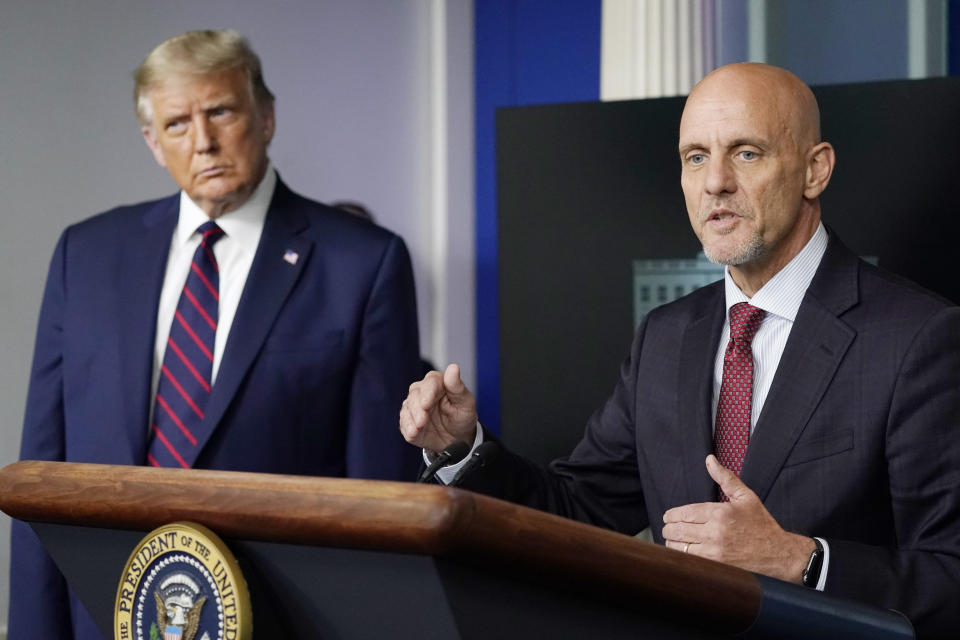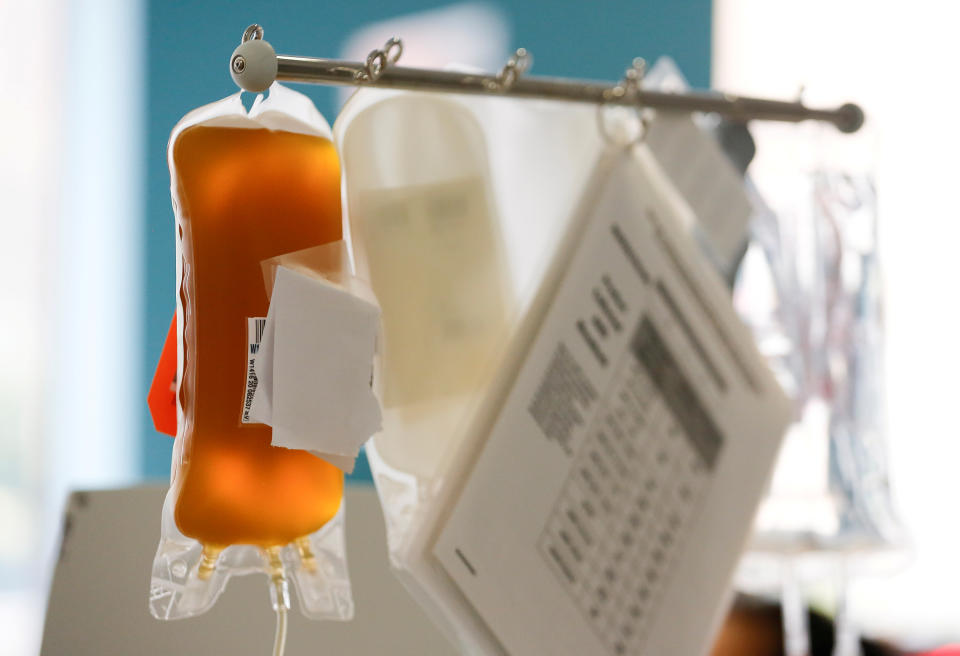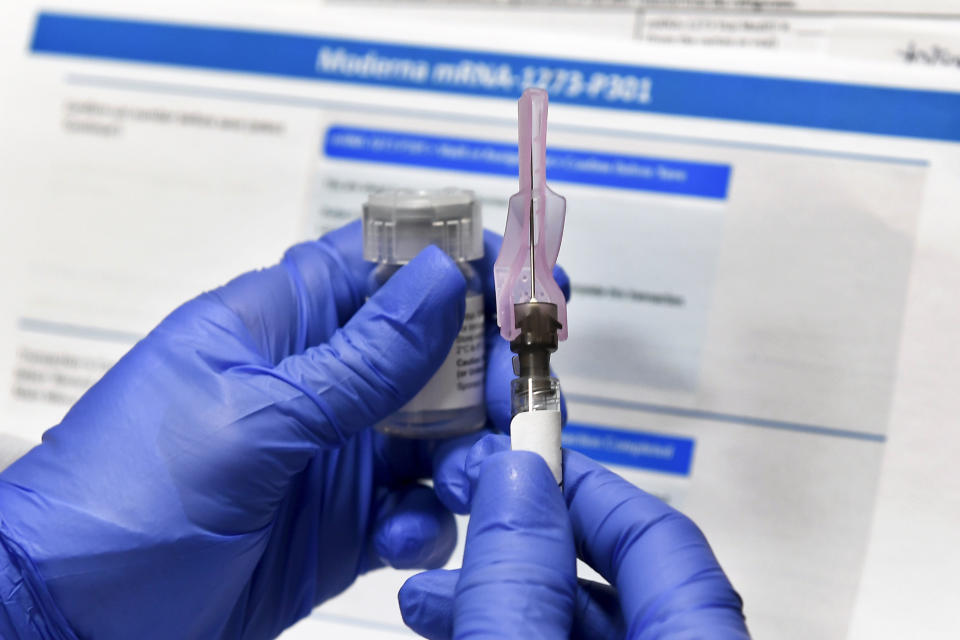Doctors alarmed as FDA floats 'emergency use' of COVID-19 vaccine, bypassing trials
Epidemiologists and vaccine experts are alarmed by Food and Drug Administration Commissioner Stephen Hahn’s recent assertion that he will consider approving a coronavirus vaccine before the completion of late-stage clinical trials.
The FDA commissioner can issue a so-called emergency use authorization (EUA) on his own if he determines that the benefits of rushing the vaccine into production outweigh the risks, but several vaccine experts told Yahoo News they are deeply concerned by the idea. No vaccine has ever been approved on an EUA basis, said Dr. Peter Hotez, a top vaccine expert, except once to overcome unusual technicalities on a military anthrax vaccine.
“We don’t do EUAs for vaccines,” Hotez said. “It’s a lesser review, it’s a lower-quality review, and when you’re talking about vaccinating a large chunk of the American population, that’s not acceptable.”
On Aug. 23, President Trump called a press conference to announce an EUA for convalescent plasma to treat COVID-19, which was controversial in its own right, but the people who might receive it are already sick; vaccines by definition are given to healthy people. In that light, it is vital that clinical trials be allowed to run their course, especially given the novel approaches some labs are employing in their coronavirus vaccine efforts, said Hotez, a professor of pediatrics and the dean of the School of Tropical Medicine at Baylor College of Medicine.
Hotez said he is troubled by the mixed messages coming from the Department of Health and Human Services, which oversees the FDA and the Centers for Disease Control and Prevention and has led the coronavirus response. The president’s Operation Warp Speed effort to find a vaccine by the end of the year has further confused the public, Hotez said, since there has been little to no communication about what is happening behind the scenes.

“This has created a vacuum that’s allowed the anti-vaccine lobby to fill, and we have a very aggressive anti-vaccine lobby in the United States,” Hotez said. He said that since the anti-vaccine forces have criticized vaccines as unsafe and as the byproducts of a rushed and “conspiratorial” process, it is risky to even consider — much less publicly discuss — cutting corners in the race to approval.
In an interview with the Financial Times over the weekend, Hahn insisted that if he determines a vaccine is safe enough for an EUA, it will be a “science, medicine, data decision. This is not going to be a political decision.”
Administration officials first signaled they were willing to consider authorization for a coronavirus vaccine without completing trials over the summer. The Financial Times reported in late July that in a meeting with House Speaker Nancy Pelosi, Treasury Secretary Steven Mnuchin and White House chief of staff Mark Meadows suggested emergency use authorization for a vaccine without completing trials.
Dr. Paul Offit, the co-inventor of the rotavirus vaccine and a pediatrician at Children’s Hospital of Philadelphia, said he worries that Hahn is being pressured by the administration, particularly in the wake of the FDA approval of hydroxychloroquine and convalescent plasma as treatments for coronavirus infection without adequate evidence that they work and are safe.
“There was never a controlled study [of convalescent plasma], so that’s the second example of something that has not been shown to work that has now been approved by the FDA under EUA, and you have the president standing up there saying, ‘This is a breakthrough therapy,’ which it’s not,” Offit said. “I think people can reasonably worry [about political pressure] now. … You see the FDA making decisions that you don’t think it would normally make, so why is that?”

“You do get the sense [Hahn’s] being pressured,” Offit added. “You do get the sense that he serves at the behest of the president instead of at the behest of the American public. You do get that feeling. I hope I’m wrong.”
Offit recalled that just a couple of days before a vital meeting to discuss an EUA for convalescent plasma, Trump publicly criticized the FDA for being staffed by the “deep state.” Shortly after that, Offit said, Hahn flew back to Washington from Colorado to meet with the president to make sure Trump was “OK with what’s going on.”
Offit said that because all the vaccines now being tested are being developed with novel strategies that have never been used commercially before, it is that much more critical to collect data in large-scale trials before a vaccine is “put out there to a group that is going to [initially] consist of mostly healthy [essential workers] who are unlikely to die from this virus” even if they did contract it.
All the vaccine experts Yahoo News spoke with also worried that the public will be wary of a vaccine that is perceived as having been rushed into production for political reasons.
“I think there are physicians in practice and public health authorities who would express a lot of skepticism about the decision [to approve a vaccine on an EUA], which would imperil the whole concept of distributing the vaccine,” said Dr. William Schaffner, an infectious disease specialist at the Vanderbilt University Medical Center. “If the vaccine is widely distributed, you can actually reduce the transmission of the virus — and if many people withhold themselves from the vaccine and don’t get it because they’re nervous about this whole process ... we will not be able to substantially diminish the transmission of this virus in our communities.”
Dr. George Rutherford, an epidemiologist at the University of California, San Francisco, said there have been devastating side effects to vaccines in the past that have not surfaced until after clinical trials have finished.

For example, one of the early rotavirus vaccines was found to cause a rare but serious side effect called intussusception, which leads to a telescoping of the intestines, Rutherford said. A surgical emergency in children, intussusception occurred in about 1 in 100,000 patients. Rutherford said this side effect wasn’t seen until after trials were completed, “so that’s something that’s racking around in everybody’s minds about rare side effects.”
“Sometimes the side effects are so rare that they don’t show up until 100,000 people have gotten it,” Rutherford said. “I think that’s the sort of stuff that we really have to be careful about.”
News reports have suggested that Trump is hoping to pull off an “October surprise” with an early vaccine release. Rutherford said the prospect of that terrifies him.
“This whole October surprise thing is just chilling — to think that somebody would try and game this like that,” he said.
Cover thumbnail photo: Pete Marovich/Getty Images
_____
Read more from Yahoo News:
You don't need the U.S. Postal Service to deliver your mail-in ballot
Yahoo News-YouGov Poll: Biden’s lead over Trump shrinks to 6 points
Ron DeSantis sidelined his health department. Florida paid the price.
First confirmed case of COVID-19 reinfection is ‘not surprising,’ doctors say


